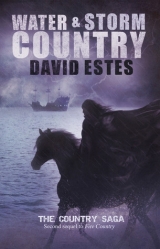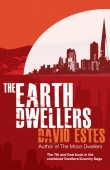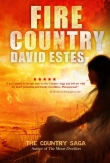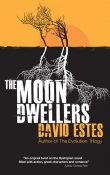
Текст книги "Water & Storm Country"
Автор книги: David Estes
Жанры:
Научная фантастика
,сообщить о нарушении
Текущая страница: 2 (всего у книги 21 страниц)
Chapter Three
Huck
Still screaming his head off, the bilge rat’s sword flies past my head, whistling in my ear as I duck out of the way.
A cheer rises up from the heavy crowd, who suddenly feel like they’re closing in, surrounding us, preventing any chance of escape. I blink hard twice, trying to get the sweat out of my eyes and the noise out of my head. My stomach clenches when I see my father watching quietly as the brown boy stumbles, regains his footing, and then turns to face me again.
I don’t know this boy—
Don’t want to fight this boy—
But I can’t let my father down again.
I squeeze my stomach muscles tight, bite away my fears, and attack, swinging my real sword the way I always practiced with my wooden one. The boy’s eyes go wide and he shrinks back, narrowly deflecting the first of my blows with his blunt blade.
Using this sword is nothing like a wooden one. It’s weighted differently and feels unbalanced in my hand, each slash becoming more awkward than the last. The bilge seems to realize it and easily dodges my next attack, kicking me in the stomach with a dirty bare foot.
I feel the wind go out of my lungs and I gasp, clutching at my gut. Like before, the boy’s face goes from fear to anger in an instant, and he kicks me again, this time in the rear and I go flying, crashing into an empty barrel and sprawling headlong on the deck.
My face is burning, so hot—red and burning. Not from exertion or anger—humiliation. I’ve literally just had my backside kicked by a bilge rat, a scrawny one no less.
But I’m not done yet.
Because my father is watching.
And there’s blood in the water—my mother’s blood. Teeth snapping. I can’t fail him.
Not again.
I push to my feet, only to sense a brown form charging from the side, slashing with his sword. I’m ready this time.
I duck, pushing my fist hard into his stomach. He doubles over and I knee him in the chin, launching him back, his sword flipping end over end as it leaves his hand. Leaping forward, I try to stomp on him, but he rolls away, grabbing his sword. He stands to face me again.
I mutter a curse.
We dance in a circle, staring at each other. There’s a fire in his eyes that wasn’t there when he was first pushed into me. Anger? Violence? No and no, I realize. Desperation. He’s fighting for his life, and I’m fighting for what? Pride? My manhood? My father? Even I don’t know anymore, only that I must continue on, finish what I started.
I slash and he blocks and I slash again, narrowly missing and trimming a shred of cloth from his already tattered sleeve.
My head spins and suddenly there’s a rush of air all around me and I feel my blood pumping and my heart pounding and sweat pouring out of me like rain, and I could’ve killed him—that last swing could’ve killed him and I didn’t even take anything off of it and if it had connected he’d be dead right now and I’d have done it.
I’d have killed him.
I don’t even know this boy and he hasn’t done anything to me except fight for his life and I almost killed him.
I realize I’m breathing heavy and on the verge of tears and my sword is lowered and the bilge rat’s staring at me, probably wondering whether I’ve caught the Scurve because I’m sweating, sweating so damn much that it’s pouring off my brow and into my eyes, blurring my vision.
I stare back at him through sweat—or are they tears?—and strands of dirty-blond hair that have come loose from my ponytail, wondering whether we can just shake hands so he can go back to his scrubbing and I can go back to becoming a man.
Sensing my weakness, he attacks with a fury. It’s all I can do to raise my sword to block his attack, the metal on metal contact ringing out, rising above the cheers of the men around me, who have come to life again. He pushes me back and I stumble. When he pushes again, I’m off balance and my legs get tangled up and I trip, dropping my sword as I try to break my fall with my hands, skidding backwards on my rear, coming to a stop.
I look up, panting.
My father stands over me, his lips a thin line beneath his beard.
But all I can see is the motion of his head. Shaking, shaking, back and forth, wishing I wasn’t his son and that I hadn’t failed him yet again.
And then the tip of the bilge rat’s rusty old sword is at my throat and I can’t breathe and I’m looking up at him and I’m scared of him doing it, but I’m even more scared that he won’t and I’ll have to face my father’s head-shaking and disappointment.
The boy’s face is hard, and for a moment I think he’ll do it, that he’ll kill me, but then he sighs and throws down his sword, letting it clatter to the deck with a dull clang. He stalks off and I close my eyes.
There are murmurs from the crowd, whispered words I can’t hear, and plenty of words that I wish I couldn’t hear.
“The admiral’s son…bah!”
“Beaten by a bilge rat, what an embarrassment!”
“He’d be better off swimming with the sharp-tooths if you ask me.”
Each comment is like a slash to the heart, cutting off another piece of me, ripping me open. Hot tears well up beneath my eyelids, but I won’t open them, not for anyone or anything. Won’t let the tears out where he can see them.
“What a joke,” I hear Hobbs mutter before he stomps away. There’s more scuffling feet and I know the crowd is dispersing, going back to their morning work.
“Huck,” a gentle voice says. A kind voice.
“Go away,” I say.
“Open your eyes,” Cain says, more firmly this time.
“No. Leave me alone.”
“Your father’s gone,” he says. “It’s just you and me.”
Great. Even worse. My father is so ashamed of me he wanted to get as far away as possible. Me, a man? Ha! I’m not even a boy, not even better than a bilge rat.
I open my eyes, squint as a ray of sunlight shoots between the billowing sails rising above me. Feel the warmth of a tear creeping down my cheek, tickling my skin.
Men don’t cry.
I wipe it away with the back of my hand.
Cain looks at me with eyes bluer than the ocean. “I saw what happened,” he says.
“Yeah, everyone did,” I mutter. “I got my ass kicked.”
“No,” he says, shaking his head. “You could’ve won. You were the better swordsman, but when you almost cut him, you freaked. You practically let him win after that.”
“I almost killed him,” I whisper, as if saying it any louder might take away the almost part, leaving the brown boy lying bloody on the deck, my sword through his gut.
“True,” Cain says. “But you didn’t. You chose defeat over ending a life. A brave choice.”
It doesn’t feel very brave. Feels awful. “Father will never make me a man now,” I say.
Cain laughs and I frown. “He doesn’t have much of a choice,” he says. “Plus, he’ll be itching to get you off his ship as soon as possible now.”
I glare at him. “Thanks for the reminder.”
I see movement over his shoulder, on the shore, and I crane my neck to look around him. “What is it?” he asks, turning to follow my gaze.
Dozens of dark Riders spill onto the beach, their black horses stamping and bucking, their swords gleaming in the morning light. Watching us. Waiting. Almost like they’re hoping we’ll come ashore and fight them.
~~~
Because I’m the admiral’s son, turning fourteen and becoming a man means leaving The Merman’s Daughter, the ship I’ve grown up on, the ship I love, from its flowing white sails to its polished decks to the songs of the sailors in the morning, bellowed on the wind as they work. Songs of glory and victory and bravery.
Songs about people who aren’t me.
The men are singing now, and their song is for me, but I clamp my hands over my ears and try to block it out. I haven’t seen my father all day, which is fine by me. Seeing him will bring me nothing but pain.
My entire cabin rocks back and forth, as the waves flow beneath the ship. I welcome the gentle, calming motion, a source of normalcy in a place that’s feeling more and more abnormal by the day.
Maybe leaving is a good thing.
Maybe all I need is a bit of change to become a man.
Maybe not.
Blood in the water. Ripping, ripping, crushing my life away.
My father’s face, paler than the white sand beaches of storm country; his blue eyes, wet at first, shocked, but then later dry and red and full of spite. Anger directed at me and my failures.
I slam my fist against my bed pad, feeling pain lance down my fingers when I hit the wood through the stuffing. But the physical pain feels better than what I’m feeling inside. I hit the bed again and again, and I realize the tears are flowing now, which only makes me angrier, because
(men don’t cry.)
Do they?
Do they?
“Bring us the boy! Bring us the boy!” The chanting begins above deck, and although the word boy is meant to be a temporary label, I feel like it’s being shoved into my chest with a hot iron.
I rub my chest with one hand while wiping away my tears on a blanket with my other—
“Bring us the boy!”
I stand up, smoothing the wrinkles on my new blue uniform—
“Bring us…”
Squeeze my fists at my sides—
“…the BOY!”
–and leave my cabin, taking the stairs one at a time, which I haven’t done since my legs grew long enough to skip a step or two.
On the top step, I pause, take a deep breath, and emerge onto the quarterdeck at the rear of the ship, above the officer cabins.
A cheer rises up, but there’s laughing too, and men elbowing each other’s ribs, telling a joke or two about earlier today, reliving my defeat at the hands of a scrawny bilge rat. Hobbs’ jokes are the loudest of all, careening across the ship, bouncing off barrels and railings and masts, swarming around me like relentless flies.
Cain greets me with a smile and a firm handshake, which I don’t return, because I’m distracted by the hundreds of torches blazing across the ship, illuminating the typically dark and shadowy deck. And I’m trying, desperately trying
(to find him.)
But my father is nowhere to be seen. Did he forget? Impossible. And yet he’s not here. He’s finally given up on me, abandoned me.
I feel a pain in my stomach so sharp it’s like the bilge rat’s kicking me again.
But no, this pain is worse. Much worse. Because my father’s not here.
“Cain?” I say.
“He’ll come,” he says, reading my mind.
Blood in the water.
“He won’t,” I say, and Cain doesn’t respond because he knows I could be right.
As Cain leads me across the quarterdeck to the edge, where it’s elevated above the lower decks, I scan the crowd. Everyone’s here, even the women, having come up from below deck, throwing aside their pots and pans and the clothes they were cleaning. Come to watch me become a man.
I recognize many men and boys I know and love, like Cain, who have been my friends for as long as I can remember. There’s Grubbs, the ship’s head cook, wearing a splotched and stained apron bulging out with the curve of his well-fed belly; a man who used to let me sit on his table and sneak extra rations of gruel before it was served to the rest of the men and women. Down the row is Croaker, the lookout with a voice like a crow, who first taught me to climb the ladder to the very tops of the tower. I spot a group of boys, jostling and pushing each other for position, trying to get the best view possible. My friends. One of them, Jobe, sees me looking their way and stops punching the kid next to him to wave. I want to wave back, but if I had to guess I’d say men don’t wave. So I just nod in his direction, finally feeling the tug of a smile on my lips.
Because I’m becoming a man! Whether my father’s here or not, this is one thing he can’t stop.
Cain clears his throat and a cheer erupts from the men and women and boys and girls, louder than before—and no laughs, no jokes. All for me.
All for me?
I feel a shadow from behind.
My father looms over me, his admiral’s cap like a dark cloud.
Chapter Four
Sadie
“Why didn’t they stop to fight us?” I ask, hours later.
Clang!
I catch my mother’s sword on the broadside of my own, spin to get in close to her, but she pushes me away with a strong hand. Although my legs are tiring, I feel reinvigorated when I suck in a deep breath of the cool, salty air.
Mother dances to the side, onto the hard sand, her feet lithe and graceful like an animal’s. “I don’t know,” she says. “They don’t always fight. Sometimes they move past us, searching for a safe place to land, to refill their freshwater supply.”
I shove the tip of my sword in the sand and release it, letting it spring back and forth in the wind. Put my hands on my hips. “But why do they get to choose when we fight. Why can’t we attack them for a change?”
She looks at me with an amused expression, her black ponytail dangling in front, over her shoulder. Her dark brown skin almost seems light brown against the darkening sky, which is one single mass of black clouds with no beginning and no end. Down the shoreline, lightning flashes in the distance. The wind picks up, tossing my untied hair around my face as easily as it picks up a fallen feather from one of the dozens of gulls that swirl overhead, cawing and crying. The waves are dark blue and churning, crashing on the sand with the strength and power of ten horses. The Deep Blue is restless.
As usual, a storm is coming, and a fierce one at that.
“Patience,” my mother says, and then leaps forward, the half-smile gone, her face hard with concentration. Her blade cuts toward me.
Clang!
I whip my own sword from the sand and narrowly manage to deflect hers away. Not that she would’ve hit me. But she would’ve pressed the point tight against my skin and lectured me on always being prepared, never letting my guard down, or any number of her favorite “Rider Lessons.”
For a while we forget about the Soaker ships, forget about the cheers erupting from them as they passed, forget about everything but our own bodies, moving, slashing, blocking, fighting, preparing for…for what?
Finally, my mother puts down her blade.
“A storm is coming,” she says, but I don’t think she means rain and lightning and thunder.
Though we both know we should run for shelter, for the camp, we sit on the sand for a while, just watching the gulls play on the gusting wind. Seems the storm isn’t close enough to scare them yet, and the birds are usually right.
“I hate them,” I say to the ocean.
“Who? The birds?” my mother says, and I can feel her smile on my face. She can be intense during training, but when she’s just my mother again she’s different.
“The Soakers,” I say, looking at her quickly, matching her brown stare.
She knows why, so she doesn’t ask, doesn’t say anything, just throws an arm around me and pulls me into her chest. Her heart beats firmly against my face.
“Don’t be so quick to grow up,” she finally says.
I pull away, embarrassed that I gave myself the comfort of my mother’s tenderness. I’m not a child anymore. “I’ll be a Rider soon,” I say, frowning. “Is Father trying to delay it?”
“Your father loves you,” she says, “it would do you well to remember that.”
“Father’s a coward,” I say before I can stop myself. But why should I stop myself? The words are on my tongue most of the time, why shouldn’t I speak them? They’re the truth, after all.
“Your father’s a hero,” Mother says.
Something red and hot and sizzling with energy tears through me, like lightning striking a lonely tree. I shudder, breathing heavy, trying to control my anger like Mother has taught me. I want to swallow the words in my mouth, if only because I love my father, despite his weaknesses, despite all his wise words and no action, despite the coward that he is. But I can’t, because of Sorrow. Because of Sadness. Because of Loss.
Because of Paw. My brother. My lost brother.
“He let him die,” I say through tight lips.
“He tried to save him,” Mother says.
“He was too weak.” My jaw aches from grinding my teeth.
“No, you don’t remember. You were too little.”
I slam my eyes shut, squeeze them so hard, like maybe if I push enough, I can force my head to remember. I want to ask her to tell me, to tell me what happened that day, the cold, hard truth, but I won’t. I can’t. I have to remember it on my own so I know it’s real. Plus, I’ve asked before, and she wouldn’t talk about it. Why won’t she talk about it?
Faint images flash in the darkness behind my eyelids. A cold, rainy night. From the little my mother has told me, I was three, Paw was four.
I remember. I remember.
We are playing together, Paw and me. Some silly game with stones and sticks. He tosses a stone, clapping and laughing when it bounces and rests on the stick. I frown, stamp my little foot. “No fair,” I say, even though I know it was perfectly fair.
I throw my own stone, but it clatters away from the stick. “I win again!” Paw yells, his arms over his head in victory.
I cross my arms and refuse to look at him, but then he’s there, with an arm around my shoulders, saying, “You’ll win the next one,” and I can’t stop the smile, because Paw is the best big brother I could ever ask for, and because I love him, and want to be just like him, and because we’re both going to be Riders one day…
Screams in the distance. Angry screams. Scared screams. Violent screams.
Torches surround us, flying through the air, carried by dark bodies. Riders, rushing to arms, to get their horses.
But it’s too late. Too late.
The Soakers are upon us with swords and knives and clubs, somehow managing to sneak in, already in the camp, slashing, cutting, killing…
The memory starts to fade, like it always does at this point, but I squeeze my eyes shut tighter still, smack the heel of my hand against my forehead, forcing it to show me—
–Paw’s death.
I have to know why I survived and he didn’t.
Thunder crashes, heavy and loud and close.
“We have to go,” Mother says and my eyes flash open. When I look up, the gulls are gone.
~~~
We’re drenched by the time we reach our tent. I duck inside first, with Mother right behind me. Father looks up from a piece of wood bark, where he’s writing something with a piece of chalkstone. We’ve startled him.
Thunder booms overhead and his eyes flick upward, as if the tent might cave in on top of us. As if he’s just realized there’s a massive storm.
I know what that means. He’s been gone. Not physically, like how Mother and I were down at the edge of the ocean, but mentally, spiritually—gone. Off in his own world, doing his Wisdom Man thing, discovering our fates by studying grains of sand in a water skin or herbs in a clay teapot. In other words, doing nothing, wasting time—while we trained for the next battle with the Soakers.
“A bad one?” Father says when we sit next to each other on a blanket, drying off.
Mother shrugs. “No worse than the last one.”
As the name suggests, storm country is a place where nature fights against itself constantly, warring in the skies—not with swords and shields and horses and ships, but with lightning and dark clouds and—
Boom!
Another heavy clap of thunder shatters the brief silence, momentarily drowning out the drum of the rainfall on the tent. Father twitches slightly. Mother and I stay as still as stones.
“What are you doing, Father?” I ask, motioning to the marked tree bark.
His eyes meet mine and I see the fear in them as they widen. “I had a vision,” he says, and it’s all I can do not to laugh out loud. He’s always having visions, but none of them ever seem to make any sense. Just because one Man of Wisdom said he would become a Man of Wisdom when he was a baby doesn’t mean it’s true.
“Tell us,” Mother says seriously. I shoot her a frown, which she returns with a clear warning on her parted lips: don’t.
I turn back to my father, sigh, say, “Yes, tell us, Father.”
“It involves the Soakers,” he says, which isn’t at all what I expected, and suddenly I find myself inching forward, lifting my head, interested—actually interested—in what my father has to say.
“Are we going to fight them? Are we going to kill them?” I ask eagerly, forgetting that his visions don’t mean a damn thing.
Now it’s his turn to frown, turning our happy family gathering into a frown party. “Sadie,” he says, and I can feel the lecture in the way he speaks my name. “Our existence is not all about killing Soakers. Sometimes the more important choice is not when to take a life, but when to spare one.”
Spare one? Is he talking about the Soakers? Because I refuse to offer any of the wave riders my pity. “Is that the choice they made when they killed Paw?” I say, my voice rising.
“Sadie, I—”
“When you let them kill Paw?” I practically shriek. Bright lights flash through our tent as lightning bursts all around us.
“Sadie!” my mother snaps, but I’m not listening to her, not seeing the lightning, not caring about the way my father’s face has drooped like the wax on a melting candle.
Wet or not, storm or not, I don’t care. I bash through the tent flaps and out into the thunder and lightning.








